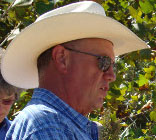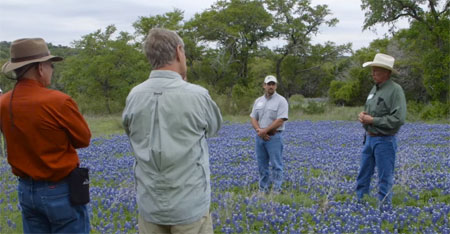A Gold Star service provider: Steve Nelle
By: Amos S. Eno
Posted on:01/30/2024I have decided it is time to highlight the conservation success stories of LandCAN’s leading service providers. This is important because of the overall decline in both services and effectiveness of federal conservation programs across the board at multiple agencies at both USDA and Interior departments.
Pronounced Nell-ee.
 I highlight Steve because our feedback reviews emphasize the incredibly effective job he does with landowners. We have a dozen reviews from clients over the last two years. For example: on 18 Jan 2024, Tina Crichfield wrote after contacting Steve Nelle, “Dear Mr. Nelle, I am the President and Training Director of the Piney Wood Lakes Chapter of Texas Master Naturalist. I participated in the TMN Tuesday where you presented Land Stewardship; it may not be what you think. It was the BEST presentation I have ever seen and heard, and I have made it a requirement for our NEW Trainees…:”
I highlight Steve because our feedback reviews emphasize the incredibly effective job he does with landowners. We have a dozen reviews from clients over the last two years. For example: on 18 Jan 2024, Tina Crichfield wrote after contacting Steve Nelle, “Dear Mr. Nelle, I am the President and Training Director of the Piney Wood Lakes Chapter of Texas Master Naturalist. I participated in the TMN Tuesday where you presented Land Stewardship; it may not be what you think. It was the BEST presentation I have ever seen and heard, and I have made it a requirement for our NEW Trainees…:”
Steve has been offering his services to landowners across Texas since 1976. He has a B.S. degree from Texas Tech and had a 35-year career with USDA’s NRCS. He is now based in San Angelo and operates as a private independent Land Management consultant and Wildlife Biologist Range Specialist. He is also writing a book, LESSONS FROM LEOPOLD, to expound on the conservation stewardship philosophies of Aldo Leopold. He also authored a superb booklet for NRCS entitled WORKING EFFECTIVELY WITH PRIVATE LANDOWNERS that NRCS has not seen fit to promote.
It is worth placing a light upon Steve Nelle’s work because not only are the services he provides land owners proficient, but his writing is both exemplary and worth quoting. In his booklet Working Effectively with Private Landowners, Nelle succinctly captures every lesson we have learned over the past 23 years in building LandCAN.
First, he puts his foot on the scale of what I call “The TRUST FACTOR”. He writes: “One of the first things to understand is that you are in the people business. Your technical expertise may be in range management, agronomy, forestry or wildlife management, but make no mistake-you are in the people business as much or more than the conservation business. Before any meaningful conservation assistance takes place, a relationship of trust must be established. Trust and confidence is the CORNERSTONE of landowner assistance.” This point is worth stressing. So much of the conservation language today is dominated by agency and program acronyms and by unabashed bowing to Science wrapped in one form or another of advocacy, that one is apt to ignore the human factor.
Conservation with private land owners is, as Nelle stresses a “people business”; it is 80% human conversations based on trust, and 20% applied science and expertise. Drew Slattery of TRUST IN FOOD makes the same point in an article from 11 October 2021 entitled Change is Human. “Before they put their dirty boots on in the morning, farmers and ranchers are humans first. If we want to empower our nation’s agricultural system to be more regenerative, sustainable, equitable and inclusive-then we are talking about empowering them to do so. We are talking about changing humans…Farming is a business, it is an identity, it is a lifestyle, it is a hobby, it is a multigenerational family legacy and so much more. Every farm operation and every person making and implementing every decision on it is unique as each person’s fingerprints.”
Next Steve puts his finger on why so many of our federal conservation programs do NOT work, despite the billions of $ allocated annually. He writes, and I stress he is a person with 35 years of experience working for USDA’s NRCS, “If you work for a government agency, you have to understand that many land-owners have a built-in distrust or skepticism about government and government employees.” This is a foundational sentiment and experience. Two years ago, I spoke with North Dakota’s Agriculture Commissioner and he stated flatly: “We tell our producers not to deal with USDA!”
 A third point that Nelle stresses is the individuality and idiosyncrasy of landowners. Quoting Bill Eikenhorst he says: “Landowners by nature are most often contrarians, who pride themselves on independent actions and self-reliance. Private land owners do not usually appreciate being told what they should do, especially by an outsider or a government agent.” So true. This mirrors my experience a thousand times over especially with USDA bureaucrats. NRCS’ grant department told me that federal funds couldn’t be used to update listings of service providers on our website. He also declared that federal funds could not be used to list technical service providers even though language specifying this task is enshrined in the Farmbill. Top down proclamations by federal bureaucrats do not resonate and only serve to alienate private landowners. Nelle concludes with sage advice for federal agents:” Avoid the mistake of being the big expert and telling landowners what they should do with their land!” This reminds me of one of my favorite quotes, H.L. Mencken’s definition of an expert: “A sonafabitch from out of town.”
A third point that Nelle stresses is the individuality and idiosyncrasy of landowners. Quoting Bill Eikenhorst he says: “Landowners by nature are most often contrarians, who pride themselves on independent actions and self-reliance. Private land owners do not usually appreciate being told what they should do, especially by an outsider or a government agent.” So true. This mirrors my experience a thousand times over especially with USDA bureaucrats. NRCS’ grant department told me that federal funds couldn’t be used to update listings of service providers on our website. He also declared that federal funds could not be used to list technical service providers even though language specifying this task is enshrined in the Farmbill. Top down proclamations by federal bureaucrats do not resonate and only serve to alienate private landowners. Nelle concludes with sage advice for federal agents:” Avoid the mistake of being the big expert and telling landowners what they should do with their land!” This reminds me of one of my favorite quotes, H.L. Mencken’s definition of an expert: “A sonafabitch from out of town.”
One of the problems with federal conservation assistance programs at USDA is they are proffered to private land owners like Moses tablets written in stone. Not only do you have to accept them with their myriad rules, regulations and stipulations, but the paperwork and inefficiency of application requires an aspirin bottle daily for weeks. As Bo jangles Robinson might opine: “this is not copasetic with my interests.” This is why private service providers such as Steve Nelle are so critical and invaluable to the scaling of conservation practices to landowners. People like Nelle listen to their clients. Good service providers can fit and apply the square pegs of federal programs into the round holes of private landowner clients.
Finally, Nelle emphasizes the importance of recognizing landowners’ peer associations and communications. Quoting Dalton Merz he writes: “landowners learn best from other landowners; it is always best to see it on the land and have landowners tell their success or failure stories.” Farmers, ranchers and forest owners in rural American, rely most on their neighbors and peer groups for advice, not government or environmental advocates pushing their opinions.
As mentioned above Nelle is writing a book on Aldo Leopold (1867-1948) whose writings in the 1930s were far in advanced of current conservation thought leaders. For decades, the environmental movement has advocated the acquisition of more and more public land for conservation. Leopold early recognized that private lands were more valuable and contributed more to public interests. Nelle quotes Leopold’s writing: “Every landowner is the custodian of two interests, not always identical-the public and his own. What we need is a positive inducement or reward for the landowner who respects both interests in his actual land practice. Conservation will ultimately boil down to rewarding the private landowner who conserves the public interest.” My favorite Leopold quote comes from his RIVER OF MOTHER OF GOD essays: “The geography of conservation is such that most of the best land will always be held privately for agricultural production. The bulk of responsibility for conservation thus necessarily devolves upon the private custodian, especially the farmer.” (The River of Mother of God p. 22)
 Sign In
Sign In
 Sign In
Sign In
